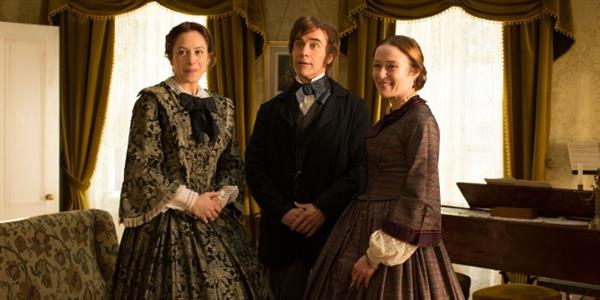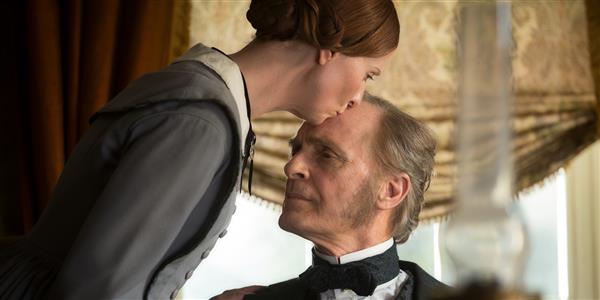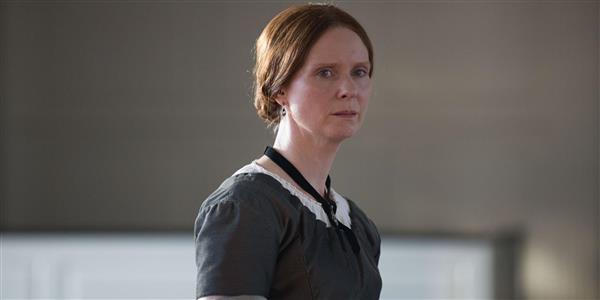A QUIET PASSION: Davies & Dickinson Are A Match Made In Heaven

Tomas is a chronic cineaste who studied English literature in…
It’s kind of extraordinary that no one has tried to make a biopic about one of America’s poetic giants until now. If you ask anyone on the street to name the first five poets they can think of, chances are that Emily Dickinson’s name will crop up more times than not. Her poetry is timeless, original, and so easily digestible that it can be taught to children at young ages. Just take a look at her oeuvre, and you will probably recognize many of her works yourself—and maybe you learned them in your youth, too.
The major stumbling block for telling Dickinson’s story is her notorious reclusiveness. A woman who never leaves her house (and, later, even her bedroom) is hardly the stuff of exciting cinema, right? Well, it looks like Terence Davies has proved us all wrong on that front. A Quiet Passion shows us that there is much more to the mythos of Emily Dickinson than meets the eye, and with Davies’ ever-lyrical vision at hand, the end result is the most comprehensive picture of her that we may ever have.
“I shall know why, when time is over”
Like many of Terence Davies’ other films, time in A Quiet Passion does not pass in the realm of obtrusive subtitles or garish close-ups at ticking carriage clocks on mantelpieces. Instead, we see the dimming of a day, a shot of Emily writing in the night by lamplight, or—in one of the film’s most extraordinary scenes—the aging of faces in real time as people pose for daguerreotypes. Time is ever-present, but only as a shadow lurking in the corner of each room, and this proves to be an important signifier of Emily’s existential crisis later on.

The film itself does move chronologically, charting Emily’s character as she grows from a fiercely independent teenager to an older woman embittered by the world’s unfairness. For Davies, though, precise dates are irrelevant. In one scene, we may see Emily trading bon mots with a friend or family member, and a few minutes later someone will marry, move away, or die. To be upended from precise temporal schemas is a bit alienating at first, but the cumulative effect is actually all the more devastating, as Emily becomes more and more closed off and sickly as a result of each personal tragedy.
Davies also asks us to remain patient with the deliberately archaic speech patterns and dialogue, which does give the atmosphere a hint of staginess. However, listen closely during the first half—especially whenever the delightfully-named Vryling Buffam (Catherine Bailey) is on the scene—and you will be taken aback by the perfectly-timed humor and irony that peppers Davies’s screenplay.
If you loved Walt Whitman’s Love & Friendship from last year, or the wittiness of Jane Austen in general, you will be sure to revel in the levity of the first act. No, it does not last—the third act in particular is quite gloomy—but it gives us a new take on Emily’s personality that most probably had not known before.
“Safe in their alabaster chambers”
What A Quiet Passion does so beautifully is let Emily’s world breathe through its silences and moments of stillness so that, even if we do not agree with her decision to remain bound to her family, we can nevertheless respect the setting she does not wish to give up.

Take, for instance, a moment fifteen minutes into the film: the Dickinson household is sitting in the parlor at the close of day, a fire burning in the grate as everyone occupies themselves with their own diversions. As young Emily (Emma Bell) looks up from her book, Davies employs a stunning 360° tracking shot of the room and its inhabitants; when the camera returns to Emily, her expression is enigmatic: she is either keenly aware of the restrictive space, or struck by the poignancy of domestic solemnity.
Both emotions play in tandem a few moments later when Emily takes to the piano at her mother’s (Joanna Bacon) request; as she plays the Christian hymn “Abide with Me,” her mother remembers a beau in her youth who used to sing the hymn at church. We then learn that he died young—a foreshadowing of the early departures that Emily must contend with in her later years. It is a short scene, and ends as soon as Bacon begins to cry over the piano’s strains. But it is a simple and brilliantly effective moment because it shows us both the effective power of art, and the tender fragility of Emily’s sphere.

Fans of Davies know that immersive tracking shots and musical memorializing are some of his signature motifs and techniques, but here they are at their most accessible. They give us a view of the kind of person Emily was and the world she inhabited in a way that is singular and intimate, and newcomers to Davies’ style will surely appreciate his lyricism here in honoring one of the most lyrical poets who has ever lived.
Conclusion
One can say a lot more about this film, especially Emily’s complex characterization as a woman haunted by mortality and her own unequal status as a woman, the harrowing moments of illness and disability, and the stunning performances given by Cynthia Nixon and Jennifer Ehle (not to mention Bacon, Bailey, Bell, Keith Carradine, Annette Badland, and Jodhi May—this ensemble is simply one to remember), but as in all of his films, Terence Davies says far more with his camera and visionary eye than words could ever hope to express.
Davies’ films are not for everyone, and some will definitely be put off by the deliberate pacing, old-fashioned dialogue, and the director’s signature interludes that emphasize tone and character rather than plot. But if you keep an open mind, and let Emily Dickinson’s world unfurl around you, I don’t think you will be disappointed. A Quiet Passion is a beautiful and entrancing achievement that does justice to its subject, and more proof that Terence Davies is one of the greatest unsung heroes of film still alive and working today.
What are some of your favorite poems by Emily Dickinson?
A Quiet Passion is out in theaters now in both the U.S. and U.K. For more international release dates, click here.
Does content like this matter to you?
Become a Member and support film journalism. Unlock access to all of Film Inquiry`s great articles. Join a community of like-minded readers who are passionate about cinema - get access to our private members Network, give back to independent filmmakers, and more.
Tomas is a chronic cineaste who studied English literature in university (in both the undergraduate and graduate levels), and hopes to pursue a career in writing. His passion for film began in earnest at the beginning of the 2010s, and since then he's been reveling at the vast horizons of the cinematic landscape like a kid at the proverbial candy store.













